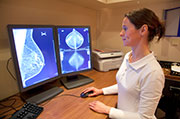Majority had issues such as anxiety, sleeplessness, often persisting long after being declared cancer-free
WEDNESDAY, Aug. 26, 2015 (HealthDay News) — A majority of women who receive false positives on mammography experience distress and anxiety, according to research published online Aug. 26 in Cancer Epidemiology, Biomarkers & Prevention.
The study was led by Anetta Bolejko, Ph.D., of Skåne University Hospital in Malmö, Sweden. It included 399 Swedish women who had abnormal results on a screening mammogram but were found to be breast cancer-free after further tests. The women completed questionnaires about their mental health before they finally learned they did not have breast cancer, and then again six and 12 months later.
Compared to women who were told they did not have breast cancer after a screening mammogram, the women in the study were five times more likely to report mental distress before they learned they did not have breast cancer. Even six and 12 months after receiving the good news, they were still twice as likely to be experiencing some mental strain compared to women who had not received a false-positive result, the authors said.
“The psychosocial consequences of false-positive screening mammograms are common and can persist over time,” Bolejko said in a journal news release. Bolejko believes that all “women invited to attend mammographic screening should be informed about the potential benefits and harm of the program, and the risk of long-term psychosocial consequences of false-positive screening mammography should be acknowledged.”
Copyright © 2015 HealthDay. All rights reserved.








